Rockbridge Academy Blog
Cultivating Joyful Worshipers—Instrumental Music at Rockbridge Academy
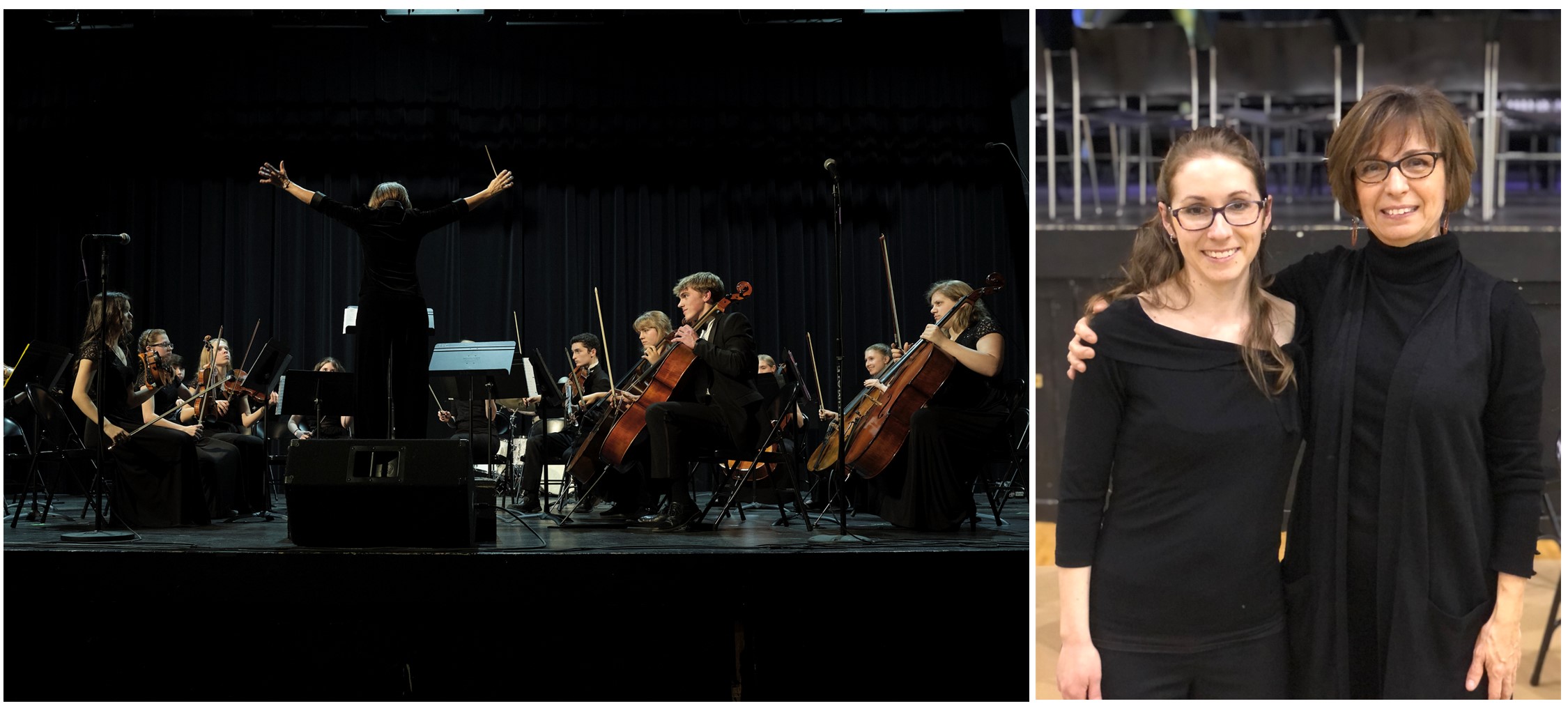
Praise him with trumpet sound; praise him with lute and harp!
Praise him with tambourine and dance; praise him with strings and pipe!
Praise him with sounding cymbals; praise him with loud clashing cymbals!
Let everything that has breath praise the Lord! Praise the Lord!
Psalm 150: 3-6
If you walk the halls of Rockbridge in the early morning, you’re likely to hear string music wafting around the corners. Depending on the day, it might be a group of young cello students playing Twinkle Twinkle Little Star, a class of small violinists working out a scale, or an orchestra rehearsing Beethoven. With violin and cello classes beginning in early grammar school grades, and three separate orchestras all the way through high school, there is string music everywhere at Rockbridge, if you know where to look for it.
Rockbridge’s instrumental program started small, but it has grown and thrived through the vision and untiring work of those who began it. Irma Cripe and Liz Horst answer some questions about the program: where it came from, how it works, and where it might be headed. Mrs. Cripe is the founder and director of the Instrumental Program at Rockbridge, and Mrs. Horst came two years later to work and teach alongside her.
How did the instrumental music program at Rockbridge Academy first get started?
In 2001, the Rockbridge choral program was founded and thriving, under the direction of Jan Horst. Years later, Headmaster Mike McKenna had the idea to start an instrumental music program. We inquired across the school to find out how many students were already taking private instrumental lessons. From the replies, we realized we could pull together a small ensemble to be featured in the 2007 Variety Show as a “teaser.” The idea was for other parents to get excited about the possibility of having their children learn to play an instrument at Rockbridge. In that 2007 Variety Show, we performed an arrangement of Grieg’s “In the Hall of the Mountain King,” and it was an enormous success.
We hoped to continue cultivating that ensemble for students who already played an instrument, including strings, winds, and percussion (there has always been a lot of talent in our school!), while starting a full-blown Suzuki Strings program to develop new players from the ground up. You really can’t have an orchestra program without a lot of strings!
At the beginning of the fall of 2007, we sent out flyers to all grammar school parents, inviting them to come learn about the Suzuki program. We also arranged for Potter’s Violins to bring to our school a large contingency of instruments to rent. That way, parents could rent their student’s instrument right on the spot. We had an incredible turnout, and 41 new string students signed up that evening for Suzuki violin and cello group lessons at school.
That first year, Irma Cripe (cellist) had to learn how to play the violin in order to teach these classes; she shared that it was quite challenging, but very fun! By the fall of 2009, it became clear that the program was growing, and we needed to hire a violinist. This is when Liz Horst came along.
What challenges have you faced, and how has the Lord worked through them?
Once we had such a successful enrollment that first year, an immediate parade of logistical challenges followed. Scheduling classes, rehearsals, and Suzuki lessons was complicated because we had to work around academics and other extracurricular activities. This is how, little by little, the program became a before-school activity, to avoid scheduling and logistic conflicts as much as possible. The other biggest challenge has always been space, particularly back in the years when we were in two separate rented locations, at Baldwin Memorial United Methodist Church and GIBC. So, we can see how the Lord has been so gracious to our school by providing a large, delightful building. Yet, even after we moved into the Evergreen campus, we found that there were still logistical and scheduling issues to be resolved. And every time we are faced with a new challenge, the Lord always provides another beautiful answer.
What is the vision of the instrumental music program?
According to Johann Sebastian Bach, “The aim and final end of all music should be none other than the glory of God and the refreshment of the soul.” Music is a common grace gift of God, through which students can glorify him, refresh their spirits, and share his beauty with others. Our program aims to nurture the growth and enjoyment of our students as they learn to play a string instrument.
Any school program is a living entity that changes as the student body and community grow. Regardless of what the instrumental program at Rockbridge might look like in 20 years, our hope is to introduce students to God’s gracious gift of music. The ultimate goal is to serve the community through well-prepared concerts for the enjoyment of listeners and performers alike, and to delight together in God’s beauty.
Why teach children to play a musical instrument?
There are many reasons to study an instrument, and here are just a few:
Music enhances academic ability. Much has been written about the correlation between music and math, as well as music and reading.
Music helps train life skills. Through the process of learning an instrument, students develop posture and poise; they practice teamwork and performance skills; and they learn to understand and appreciate music.
The study of music builds character. Learning an instrument requires discipline, perseverance, and patience through daily practice over many years. Students have to wrestle with failure and frustration, while working for a perfection that seems always beyond reach. In some ways, the process of learning an instrument mirrors our Christian daily walk–failing, asking for forgiveness, studying the Word, and keeping Christ and his perfect beauty always before our eyes.
And the best reason of all, the ultimate goal of our music classes, is to equip students to become skillful, joyful worshipers of our Lord. Students who know the language of music and love it, can better sing and play to the glory of God, who shows us some of His own beauty through music.
By making music with a group of fifteen other musicians, or forty other musicians, depending on the concert, I have contributed to something greater than myself. Playing in an orchestra has provided a time to worship the Lord with my peers, to offer up the beautiful work of our hands, and to magnify God's name with many sounds and instruments. I'm so grateful for all the time I've been able to have in Rockbridge's orchestras. ~Olivia
What advice do you have for young families with an aspiring string player?
The most important advice we could give to beginning families is to make a firm commitment for at least a full year, through ups and downs. To quote E. A. Guest, “rest if you must, but don’t you quit.”
Mrs. Cripe is able to teach all kinds of people: young and old, hard working and not hard working, wise and foolish, tall and small, helpful and unhelpful, forgetful and rememberful, respectful and disrespectful, confident and shy, happy and sad, violinist and cellist...and violist! My favorite performance was the 2024 Christmas concert, when we got to accompany Olivia, and we got to play on the stage! ~Savannah
How does the Suzuki method of learning fit the classical model?
The Suzuki method fits beautifully with the classical learning model. It is based on the premise that students learn music the way they learn a language or any other skill–step by step, through listening, watching, repeating, and memorizing. They gain facility with the basic patterns, terms, and concepts of music in the grammar years, preparing them to develop a more advanced understanding of music theory and music performance in the dialectic and rhetoric stages.
I learned that I don't need to take all the corrections personally. I don't get offended anymore. I just like making the music. ~Emmett
How did Strings Summer Serenade get started?
At the end of the first year of the strings program, it became evident that the students needed some fun activity in the summer to encourage them to continue practicing and growing in their skill. We scheduled a week in July with the goal of having fun playing music together. We would review what we had learned (review! review! review!) and learn some new and accessible music. The week was very successful, and that’s how Strings Summer Serenade was born. The camp currently draws between 40-50 students every summer from Rockbridge and outside our community. It is a summer highlight for many of the students. What to join us this summer? Register HERE!
The first year I did Strings Summer Serenade I was very excited to see what music we would play. When I looked at the music, I was very worried that I could never do it…but at the end of the concert, I remember being so thankful for all the work [Mrs. Cripe] put in to make it happen and for the encouragement that [she] gave me to learn and enjoy the music! ~Geneva
Do you allow homeschooled students in the orchestras?
From the beginning of our instrumental programs, homeschooled students have been an integral part of the orchestra’s growth. An orchestra always gains beauty and strength from having more string players, so there is always room for more. And it is convenient that rehearsals occur early in the morning before school starts, when there are no scheduling conflicts.
I really enjoy the experience of being able to do something that I can’t do on my own. Being live and being connected to the source of the wonderful music taught to us as a group is an unforgettable experience. I feel that it has also challenged me and has led to my progression as a musician. I am blessed to be part of such a wonderful group of people with a similar love of music. ~Katie
Irma Cripe is the founder and director of the instrumental music program at Rockbridge Academy. She directs both the Scots and Camerata orchestras. She and her husband, Max (also a fellow musician), have two Rockbridge graduates from the class of 2014 and 2019.
Liz Horst is the Evergreen orchestra director and the Suzuki Strings violin teacher at Rockbridge Academy. She and her husband, Justin (Class of 2004), have three children.
A Part of Our Rockbridge DNA: A Reflection on Faculty Morning Prayer
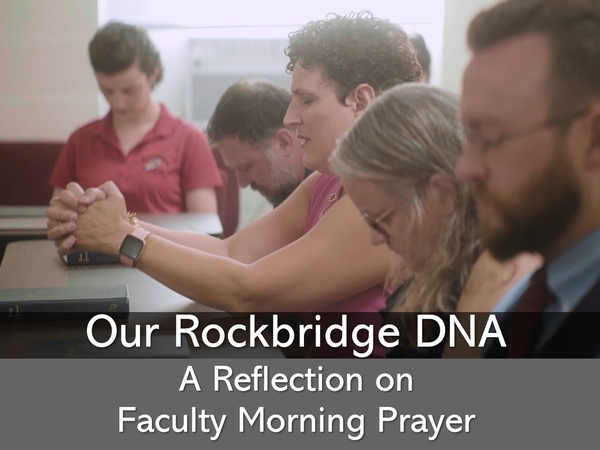
As students come into the building each morning, they hear a strange sound echoing throughout the hallways. It's an unfamiliar sound in schools and buildings to be happening at 7:30 in the morning: sometimes louder, sometimes softer, and sometimes a higher or lower pitch. And then it abruptly stops about three minutes later. The sound comes from Mrs. Kennedy's Physics classroom. But the students hear it every day, so they no longer raise their eyebrows and ears to figure out what it is. It's completely normal to them.
What the students hear each morning is the sound of their teachers singing a hymn a cappella. Since the door is left ajar, the sound travels. From the entrance of the school, you can just make out murmurs set to pitch; as students walk further into the building, the words become more recognizable. School hasn't started yet, so students are unloading book bags and already nibbling away at their lunches, casually hanging out with friends with heels up on their locker doors. To them, hearing adult men and women singing full voice is not strange to them. It's just what their teachers do.
#87: Holy, Holy, Holy, Lord God Almighty! / Early in the morning our song shall rise to thee; / Holy, Holy, Holy, merciful and mighty! / God in three Persons, blessed Trinity!
Each morning the Rockbridge faculty and staff gather together to sing a hymn and pray together for our students, families, and alumni. This is absolutely one of my favorite things we do. Here's how we do it.
When the bell rings at 7:30, someone picks out a number from a blue Trinity Hymnal. We've all picked one up from a bookrack as we've entered, so we're ready. It's a bonus when we're accompanied by a piano or a flute, but we're normally a cappella. Some of us try to sing harmonies—others succeed. And if it’s one of those hymns with the extra verses written beneath the final music staff, we sing all the extras too.
The collection of blue Trinity Hymnals with a solitary gold cross on the front have been gifted to us from various churches as they have updated to the newer red hymnals of the same design. Inside the front cover are stamps of the names of the donating churches. That our hymnals which allow us to sing together do not all come from one church but from several reminds me of the fellowship of families which belong to a myriad of church congregations and denominations but come together to form one Rockbridge. The Trinity Hymnal has been a new hymnal to me, but it has nearly all of my favorites.
#122: O ye heights of heav'n, adore him; / Angel hosts, his praises sing; / All dominions, bow before him, / And extol our God and King.
That our hymnals which allow us to sing together do not all come from one church but from several reminds me of the fellowship of families which belong to a myriad of church congregations and denominations but come together to form one Rockbridge.
After singing, we pray for current Rockbridge families and for alumni, selecting about five or six families each day. There's even a binder labeled "STAFF MORNING PRAYER LIST" to make sure we don't miss anyone, moving alphabetically through a roster of family names throughout the year. If you are an alumni, please know that we still pray for you by name. Your teachers delight in remembering you. For current families, please know that we pray for your entire household by name. As an Upper School teacher, praying for Grammar School students is how I have come to know the students who will one day be in my classroom.
If you are an alumni, please know that we still pray for you by name. Your teachers delight in remembering you.
We also take prayer requests for the faculty and staff for the day. It is here that we have shared in some of the greatest joys in each other's lives while also lamenting the greatest of sorrows. In a way, to pray for someone is to truly know them because it is to properly see them, their joy, or their sorrow in relation to God's ever-present care. Similarly, to be prayed for is to be known. It has meant so much to me on the days when I have asked my colleagues to pray with and for me.
It is here that we have shared in some of the greatest joys in each other's lives while also lamenting the greatest of sorrows.
The hymn, the prayer requests, the fellowship of prayer. This all happens in about ten minutes. And I'm so glad it does. It would be so natural to start the day together but to do so merely for the sake of making announcements and reminders about the day. And while we do sometimes have those, the focus is on preparing our hearts for the people and the learning of that day. As the school begins to be filled with students, it is also filled with prayer asking God to guide, to protect, to nurture our students.
I wanted to know when this rhythm began and how it had evolved, so I went about asking those teachers who were starting school days fifteen, twenty, or twenty-nine (!) years ago. All of them said the same thing: it’s one of those things that everyone remembers doing but doesn’t remember when or how it started. It struck me that singing to God and praying to him are just a part of the DNA of Rockbridge. Just as we don't remember learning to brush our teeth or how to tie a knot, at Rockbridge we sing to God and pray to him because it is part of the fabric of who we are.
#492: Take my voice, and let me sing, / Always, only, for my King. / Take my lips, and let them be / Filled with messages from thee.
It struck me that singing to God and praying to him are just a part of the DNA of Rockbridge. Just as we don't remember learning to brush our teeth or how to tie a knot, at Rockbridge we sing to God and pray to him because it is part of the fabric of who we are.
Godspeed and Resurrection
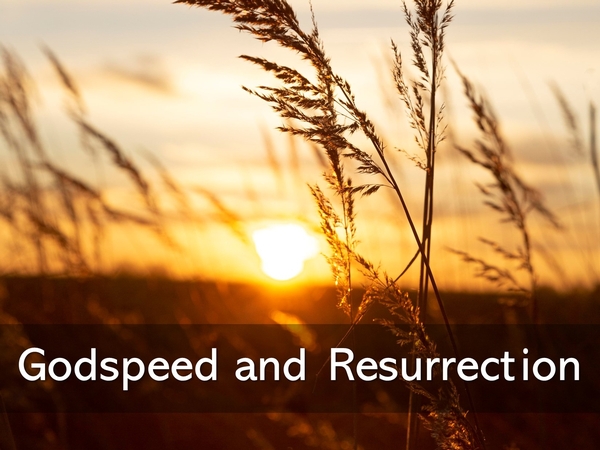
While all that borrows life from thee is ever in thy care, and everywhere that Man can be, thou God art present there.
I Sing the Almighty Power of God—Isaac Watts
In the opening week of school, we spread the word that the unifying theme for the year at Rockbridge Academy would be the simple salutation, Godspeed. In an essay about Godspeed written in early September, I challenged our community to ask God how to abide in Christ in the individual moments of life, to take each step under His lordship, and so to literally do life at God’s speed. Because He has seemingly hardwired a certain pace for most activities of daily life, we should find ourselves slowing down (or speeding up) to intentionally keep in step with His lordship over each task of our day.
From the setting aside of schole weeks throughout the year in upper school with extended time for meditation and discovery, to the weekly focus on theological truth in grammar school during Monday Morning Catechism, or even in our personal goals, like the challenge I made to myself to slow down enough to learn every child’s name by the end of October, Godspeed has been about a joyful and intentional stewardship of the minutes and hours granted us. As a result, I see the community of Rockbridge Academy loving God more worshipfully and loving neighbor more intentionally.
From the Moment to the Momentary
But alas, no sooner had the September leaves started changing, than the Lord began impressing on us an even more profound lesson of Godspeed. Having been around this community for many years, I can attest that there has never been a season so unspeakably tender, so poignantly Providential, and yet so exceedingly painful for Rockbridge families as the valley of tears we have experienced in recent months. Rockbridge Academy has had more dads inexplicably pass away than one can count on one hand. This has been as grueling as it has been mindboggling. Yet one thing we do know is that if Godspeed is about the reality of abiding in Christ’s lordship each moment, nothing reveals a sense of that lordship like the tragedies that show us how momentary this life can be.
In his book, The Problem of Pain, C.S. Lewis famously stated that, “God whispers to us in our pleasures, speaks in our conscience, but shouts in our pains: it is his megaphone to rouse a deaf world.” Humbly, I would posit that our Father has been shouting love messages to us through this succession of recent calamities. Contrary to adding insult to injury, these multiplied losses within the Rockbridge community have somehow served to amplify the LORD’s love for His people …to a cosmic proportion. On one hand, such a deluge of events causes us to fall on our faces and cry out in holy disbelief, “The Lord Almighty! He reigns!” Yet at the same time, witnessing over and over the redemptive stories brought out at each funeral, seeing the fruit of the Gospel being celebrated, and repeatedly witnessing the people of God close ranks around hurting families in service, mourning, and generosity only confirms beyond doubt that we are held firmly by a loving Father.
Not One Drop Wasted
Years ago, when my own dad, a very healthy sixty-year-old, died unexpectedly in his sleep, God met me through the book of Ecclesiastes and did battle with my throbbing disbelief. The words on the page did not remove the aching pain that ebbed and flowed in my heart, but relentless truth from God’s word galvanized an internal assurance that Christ has forever removed the sting of death. Regardless of whether we want to acknowledge it or not… Love wins. Joy conquers. Jesus reigns. In the same way, raw, unadulterated, industrial grade assurance is being poured out on our community through these tragedies, assurance that Jesus Christ rules over all. May the year of 2023-24 serve as a lasting witness to our children.
As we celebrated Easter, both mourning and celebrating over recent events, we are forced to the bold precipice of the resurrection and have to admit that it could not be with caprice or coldness that the Father offered up his own Son to death on a cross. Likewise, in the months ahead, we can be confident that our loving Father will not waste one drop of this year’s agony in His plans to bring the abiding good of His redemption to this community.
Godspeed. He is Risen!
On War Stories
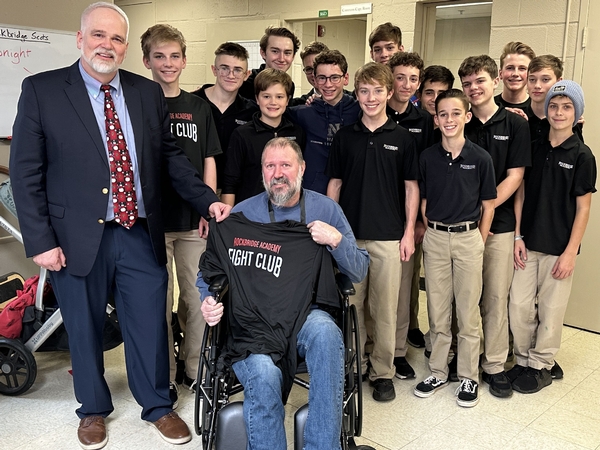
This article was written in March 2020 by Nathan Northup, Rockbridge Academy Bible teacher. He went to be with the Lord on November 2, 2023. His legacy will live on through the hundreds of people he loved, served, and counseled, both in his ministry to the church and in the Rockbridge community.
“Kick in the gates of hell! I’ll see you on the other side!” is the charge I imagine a great military commander bellowing out to his troops as they storm forward with swords raised high to take captive the great fortified city: Death. The Lord Jesus Christ said that the gates of Hades (death) will not prevail over His Church. As Christians, we know that we have been delivered from the dominion of sin and death and into the glorious kingdom of our Lord and thus enlisted as soldiers in the great battle, not against flesh and blood but against the principalities in the heavenly places.
In particular, here at Rockbridge Academy, our very motto is to TAKE EVERY THOUGHT CAPTIVE and make it obedient to Christ Jesus. The principle is clear throughout the Christian Scriptures that WORSHIP IS WARFARE when we consider all the oddly warlike language used to describe our journey. Every baptism, prayer, song, sermon, sharing in the body and blood of Christ, hearty joyful giving is an act of war. This war is waged with faith, hope, and love. We’ve been given weapons for offense and elements for defense. We desire that God destroy all of His and our enemies by capturing their hearts and adopting them into His family, enlisting them in His army, converting them to change their allegiances. We pray and preach and praise to this end. So then, when we gather as God’s New Covenant people for corporate worship, we have drawn our battle lines, and we go to war. All who are in this battle were once on the other side of the field and were graciously conquered by our triumphant King who leads us in His glorious procession.
This is why, every Monday in the Dialectic Bible classes, I ask for war stories. These war stories are testimonies of what God was doing in their life during the battle in the previous Lord’s Day corporate worship. Most of the time, the students testify to the Word of God given by their pastors, but we also hear stories of baptisms, confirmations, first communions, missionary testimonies, and more. I will sometimes jest that very rarely, if ever, have I had someone come back from the battle and testify to what a great encounter they had with the only true and Triune God during the tithes and offering portion of the service.
When all is said and done, I desire for my students to see the hand of God working in their midst and to rejoice in what He is doing as He works through them to destroy evil in our lives and the world around us. When we head off to worship Christ our King, let us kick in the gates of Hell so that when we have overcome on that great Day, we can look back across the battlefield and raise our swords and glasses to the One who has overcome and trampled down death by death giving us His very life that we may conquer and live with Him!
When all is said and done, I desire for my students to see the hand of God working in their midst and to rejoice in what He is doing as He works through them to destroy evil in our lives and the world around us.
Mr. Northup Points to God's Providence
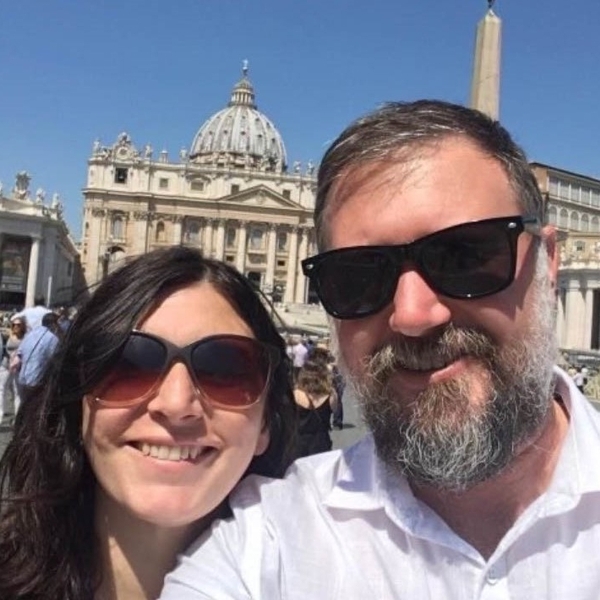
One year ago, Mr. Northup retired from teaching at Rockbridge Academy after being diagnosed with brain cancer. Mr. Northup greatly impacted my life so when I was given the opportunity to write about his life, I took it. This article is dedicated to Mr. Northup and his family for their 17 years of love and support of Rockbridge Academy.
I know many of us are wondering how he is handling the cancer, but more so why he, of all people, got cancer. Mr. Northup was one of the greatest Bible teachers I (and all of Rockbridge) could have asked for. He displayed his faith in every word and deed, and his love for his students and the subjects he taught was unmatched so, why did Mr. Northup get cancer? This question can be restated in this infamous question: why do bad things happen to good people?
That was my main question for Mr. Northup, and he answered it. Before I reveal exactly what he said, make sure to actively look for the providence of God in Mr. Northup’s life throughout the rest of this article.
Mr. Northup was born in Rhode Island and moved to California a year later. At eight years old in California, he dreamed of becoming a real-life Tarzan but he had two problems preventing him from becoming the rope-swinging monkey-man. For starters, he lived in California, and one cannot be Tarzan when climbable objects are limited to a “cactus and a palm tree in the backyard.” This problem was solved when he moved back to Rhode Island the same year where trees grew as commonly as the California cacti. His other problem was more serious: he needed a Jane, but where to find the perfect girl? He did not need to look far; across the street lived the future Mrs. Northup, Merry Dupre. Mr. Northup said that from a young age he knew he was going to marry her. If she made a great Jane, which she did, then she would make a great wife. Obviously, he convinced the girl across the street that he was worth keeping around as they have been married for 27 years and have had five children.
Mr. Northup’s youth in Rhode Island involved street fights and big older brothers. Our teacher was small for his age but hotheaded. He was known for roughhousing and the kids on his street beat him up multiple times. However, they stopped picking on him after Merry’s brother began looking out for him. Her brother was big and strong with a statement 70s hairstyle, a mohawk.
While Mr. Northup had his fair share of fighting, he also spent a good amount of time in church. He was brought to church as a child, but only began searching for God in his teenage years. He told me that, “Everyone at church had a testimony but I didn’t.” Mr. Northup decided to change that by becoming a rebel until he had a good story to tell.
Mrs. Northup said this time was short lived once they had their first child, Samuel, when he was 17 and a daughter, Nadia, at 18. With two children and little stability, Mr. Northup decided to start bringing the family to church, but he made a mistake and joined, as he called it, a “cult” instead. The church that the Northup family joined preached that one’s salvation depended upon their daily missionary work. One had to share the gospel every day to a random stranger to secure their own salvation. Mr. Northup realized that this teaching did not match his understanding of the Bible from his youth. The dissonance between his understanding of the Bible from childhood and what this church was preaching lit his heart afire for God and truth.
Mr. Northup was hungry and curious to know God’s word, so he sought out the youth pastor from the church he grew up in and began a mentoring relationship with him. To make ends meet he worked as a mechanic until he pursued seminary at age 20. He brazenly decided to attend Moody Bible Institute in Chicago. At first, the college rejected him but that did not stop our teacher. He caught a flight from Rhode Island to Chicago to meet the admissions board face to face. He told them, “I am going to come, but how do I do this?” Seeing the passion of this young teacher changed the hearts of the board. Mr. Northup’s grades were not great, and he was behind in the necessary schooling, but his heart was ready to tackle any obstacle presented to him. The college offered him a deal: he would take night classes until he was ready for full admission into regular daytime classes. Eventually, Mr. Northup worked his way up to those daytime classes and even earned a full ride. During this time, he moved his family out to Chicago and received free housing from a nearby church in exchange for his cleaning services. His living costs were low, so he only had to provide food for his family. Thankfully, the window washing business was booming and he received a job cleaning windows for around $100 an hour.
Here, Mr. and Mrs. Northup had their third child, Josiah. After finishing college with a wife and three kids, he moved back to Rhode Island, desiring to impact children’s lives. He first thought about working at summer camps, but a week or two was too short to create a lasting impact. He then considered becoming a pastor, which he did for three years, but he still wasn’t achieving his goal of teaching children. He decided to change careers once more and become a teacher.
The first and only school Mr. Northup taught at was Rockbridge Academy. When deciding where to teach, Mr. Northup and his wife asked the question, “Who do we want our kids to be?” They came upon this one, strange way of teaching called classical Christian Education. They fell in love with the idea of teaching children with a focus on the liberal arts but centered around Christ. Mr. Northup told me concerning classical Christian Education, “This is the way Christians ought to be training their kids.” The Northups found a classical Christian school called Rockbridge Academy which they thought embodied the classical Christian spirit and teaching they desired for their kids. Mr. Northup applied to work here and hit it off with the school board, landing the job for a Bible teacher. He served at Rockbridge for a total of 17 years and during this time, had two more children, Luke and Emma. I asked him which Bible class he enjoyed teaching the most and he answered, “Christ in the Old Testament . . . We get to explore the question ‘where specifically is Christ?’”
Sadly, as we all know, Mr. Northup has left Rockbridge and pursued treatment for his cancer. He said that in these hard times, his wife, Merry Northup, has been his continuous rock and constant companion, a true helper. He is also very grateful for the time he can now spend with his immediate family and his three grandsons. God’s providence, which has shown itself time and time again, is clearly woven throughout Mr. Northup’s life. God has provided in countless ways from protection in his youth to free housing in college and ultimately a job at Rockbridge Academy. To end this story, I want to provide you with Mr. Northup’s answer to the question, “Why do bad things happen to good people?” He said, “This sounds cheap, but I don't think that people are good; I think that God alone is good and He's gracious. I don't expect that I should get things because I'm good or because I'm not. He is. That's one part. The rest is grace. He's been gracious to me with everything from my family to provision. I don't expect that I should be taken care of. Everything is grace. I am grateful for the provision of my family. I can't do anything more than simply be grateful. I don't know if that's the right way to think about it, but that's what I think.”
Hannah Bates is currently in 11th grade and a member of the Rockbridge Review (student-run school newspaper) editorial team.
Why Do We Sing?
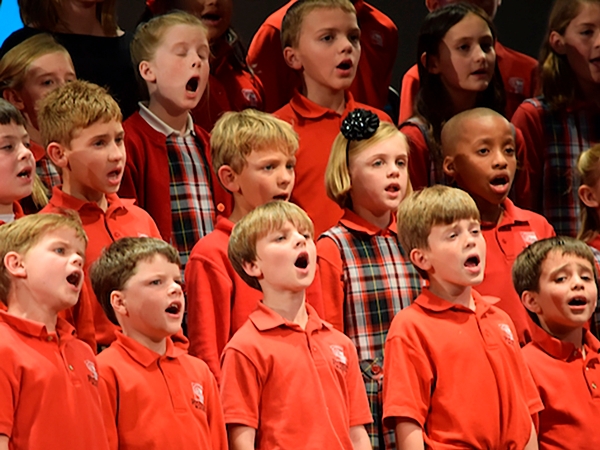
On my last morning at Rockbridge Academy, my classmates and I all came together for one last joint homeroom. Miss Scheie passed out the hymn books one more time and aptly chose for us to sing “Be Thou My Vision.” Suddenly I found myself close to tears, surrounded by classmates and friends, all lifting our voices up as one body praising our Lord and asking for His guidance in this next chapter of our lives. The rest of the day I walked the halls humming that tune, the words repeating in my head over and over. This day is representative of many I have had in the past at Rockbridge. The prominence of singing at Rockbridge Academy demonstrates its importance for instilling truth and fostering unity.
The prominence of singing at Rockbridge Academy demonstrates its importance for instilling truth and fostering unity.
Singing is not scarce at Rockbridge Academy. From staff prayer to joint homeroom to Monday morning assemblies, the words of “Great Is Thy Faithfulness,” the Doxology, and other hymns float through the halls. Singing is a prominent technique in the grammar school, and you won’t make it through a Rockbridge event without singing or being sung to. We even spent a whole Apologetics class putting the Beatitudes to the tune of Taylor Swift’s “You Belong With Me.” This is primarily due to the fact that singing helps with memory. Our grammar students can name all the states or rattle off grammar rules because they learned a song for it. However, singing as a tool for memory has more uses than just to memorize facts.
One day in my junior year, I was at an early morning FCA Bible Study and we were talking about singing. One senior made the point that what we sing stays in our heads and permeates our thoughts. Everybody has had some song stuck in their head that they just can't seem to get rid of. Well, it doesn’t have to be an annoying pop song that permeates your thoughts. I experienced the positive end of singing on the last day of my senior year after singing “Be Thou My Vision.” Instead of the chorus to Justin Bieber’s “Baby”, my mind was whirling with words praising God and reminding me to focus on Christ. By singing hymns frequently, Rockbridge was filling our heads with beautiful Gospel truths that would permeate our thoughts throughout the day, week, and even year.
As well as instilling truth, singing as a body creates unity with your fellow singers. When we sing as one body, we are lifting up our individual voices to become one voice proclaiming one truth. The old and young, the mature in faith and new Christians, those in mourning and those rejoicing: when we sing we demonstrate that we are one body. That is what brought me close to tears in my last homeroom: despite differences and even disagreements I may have with my classmates, we are still able to come together, shoulder to shoulder, and proclaim Jesus’ name.
…when we sing we demonstrate that we are one body…despite differences and even disagreements I may have with my classmates, we are still able to come together, shoulder to shoulder, and proclaim Jesus’ name.
On Grand Tour, my class had several opportunities to sing together. One opportunity was in the Tomb of Agamemnon at Mycenae. The egg-shape of the tomb gave it great acoustics, so we stood in the middle and sang the Doxology. The whole site went quiet as we sang. Tourists stopped moving and guides stopped talking. Many of these people didn’t even speak our language, yet they were silenced and stilled. Whether it was out of awe or reverence or simple respect I don’t know, but to me it demonstrated the power of song. It was evident not through our words, but through our unity as a group lifting up our voices that we were honoring something bigger. Indeed, we were praising the God of our universe.
You do not have to be a good singer for singing to impact you. I would be the first to admit I lack singing abilities—I can’t even read sheet music. Thankfully, that is not required to sing with your community and praise our God. The next time you find yourself singing in church or at Rockbridge, close your eyes and listen. Hear the ten, twenty, thirty, or a hundred people around you singing the same song, worshiping the same God. This is the body of Christ. I hope you continue to sing often and sing loud, praising the name of your Lord and Savior. I would like to leave you with the words I was left with at the closing of my time at Rockbridge:
True Light of heaven, when vict’ry is won
may I reach heaven’s joys, O bright heav’n’s Sun!
Heart of my heart, whatever befall,
still be my vision, O Ruler of all.from Be Thou My Vision
Olivia Reardon, ‘22, attends Messiah University where she continues to pursue her passion for teaching, writing, and dance. She loves reading, spending time with friends, and eating ice cream.
What Are You Doing for the REST of Your Life?

“I’m not tired! Why do you always tell me I am tired when I am not tired!” Such were the protests from my early youth when my parents knew that I was overtired and lovingly sent me upstairs to bed. Little did I understand at the time that my rantings only added to their resolve to get me the sleep I needed.
How many of us still need this—someone to make us go to bed when we are tired, or insist that we take a break to rest? When so many things press in on us, demanding our time and attention, sleep, or rest of any kind, can seem like the most expendable part of our schedule. But to deny ourselves rest, a break, and even sleep is to behave like children lacking wisdom, obedience and faith.
Brain researchers have discovered something amazing that happens when we go to sleep. While our bodies are still, our brain is performing some important work. Like the cleaning crew that comes into the office after hours, your brain is also busy at night:
“In fact, when the lights go out, our brains start working–but in an altogether different way than when we’re awake. At night, a legion of neurons springs into action, and like any well-trained platoon, the cells work in perfect synchrony, pulsing with electrical signals that wash over the brain with a soothing, hypnotic flow. Meanwhile, data processors sort through the reams of information that flooded the brain all day at a pace too overwhelming to handle in real time. The brain also runs checks on itself to ensure that the exquisite balance of hormones, enzymes and proteins isn’t too far off-kilter. And all the while, cleaners follow in close pursuit to sweep out the toxic detritus that the brain doesn’t need and which can cause all kinds of problems if it builds up.” (“The Power of Sleep,” Alice Park, TIME, Sept. 2014)
When we are awake, the brain is busy handling the immediate demands of the day. Just as we cannot reflect and meditate at the same time we are teaching or having a conversation, our brains cannot run the “daytime show” while simultaneously cleaning up the place and dumping the trash. As teachers and parents, we understand this principle quite well. We don’t try to clean up while our kids or students are around. We wait until they leave or have gone to bed to clean up from the day’s activities. It is the same with your brain. Unfortunately, we often believe the opposite, thinking that skipping sleep (or rest) will allow us to get more done. God’s Word rebukes this notion:
“It is in vain that you rise up early and go late to rest, eating the bread of anxious toil; for he gives to his beloved sleep.” Psalm 127:2
God, our creator and sustainer, knows what we need, and has told us. But knowing is one thing, obeying is another.
We know intuitively and experientially that we are finite beings; we have limits. The Bible describes us as “dust,” like “grass” and “flowers” that blow away (Ps. 103:14-16). God, on the other hand, is “the Creator of the ends of the earth. He does not faint or grow weary,” (Is. 40:28). Yet God establishes rest as part of His creation from the beginning: the seventh day is a Sabbath. He commands us to recognize and obey this regular time of rest. And this concept of rest permeates the whole Bible. Type “rest” into your Bible search engine and a theme quickly emerges from verse to verse: rest is a gift from God, and those without it suffer and are cursed. This is stark language that speaks to the seriousness of our self-sufficiency. Weekly rest, our nightly sleep, even routine breaks during each day are acknowledgements that we are not God. Instead, we accept and obey our limits, affirming the order of Maker vs. creature. Rest becomes an act of humble obedience. Obedience that leads to faith.
Going to bed, or simply stopping to rest, can be an act of faith. Our to-do lists often haunt us. But God’s promise is clear, “Come to me, all who labor and are heavy laden, and I will give you rest,” (Matt.11:28). This is one of those verses we hear so often that we carelessly cast it away presuming we’ve already grasped the concept. But have we? Do we believe it, not just as some hope for eternal rest, but here and now, today, this moment? Our "Best Self Journals" and "Full Focus Planners" cannot ever give us what only our Heavenly Father can give: that eternal and continual promise of rest. God causes us to lie down and sleep in peace (Ps. 4:8); we wake again for He sustains us (Ps. 3:5). Do you suppose God wants you to work beyond exhaustion or without refreshment? Then listen again, “For the one who has entered His rest has himself also rested from his works, as God did from His” (Heb. 4:10). Pray that you would believe it. As Augustine said, “Our heart is restless until it rests in You.”
One more thing: “Good night, sweet dreams.”
A Difficult Devotion
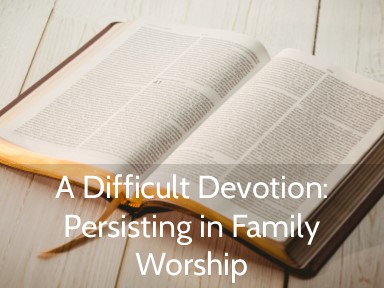
Family, worship. Two words, each of which standing alone is richly warm and evocative. “Family” connotes community, belonging, and love. “Worship” conjures thoughts of reverence, jubilation, and communion. However, curiously (and sadly), when these two precious terms are conjoined into a single phrase (family worship), the associated words that come most immediately to mind are “boring” and “bland.”
Having lead family worship in our home for nearly thirty years with reasonable consistency and intentionality, I must confess that it is not one of my more successful endeavors. Although I have not had the courage to poll them, I suspect that “boring” and “bland” might summarize my children’s collective assessment. Nevertheless, by grace, my wife Deni, and I have persevered through the years clinging to the conviction that, in conducting family worship in some form on a regular basis, we are about a noble business the ultimate success of which is not only determined by God but is best left to Him to measure as well.
At our house, family worship has taken on many different forms over the years, but almost always it has consisted of three essential elements: God’s word, prayer, and singing.
1) The Scriptural Component—For many years, we used a family worship card distributed by our church that listed daily Bible readings designed to prepare us for the upcoming Sunday’s sermon. At other times, I have simply read a Psalm or other short passage. More recently, I have used a daily reading from a devotional book such as (a) My Utmost for His Highest by Oswald Chambers, (b) C. H. Spurgeon’s Morning and Evening, and (c) Note to Self by Joe Thorn. In the early years, when we had only young children, our Bible readings were “age appropriate.” However, in those middle years when our children’s ages spanned 17 to infancy, I refused to “dumb things down” and stubbornly taught to the eldest level, trusting that the younger ones would glean what they were able and calling on the older children to explain any difficult concepts to their younger siblings.
2) Prayer—The prayer component of our family worship has consisted primarily of thanksgiving and intercession. We collectively identify prayer items, and one or more of us leads in prayer about those particular matters.
3) Singing—Typically, we close our worship with a song, which could be a hymn, a contemporary chorus, or simply the doxology.
Beyond content and format, I have learned that consistency is critical to family worship. As in virtually all other worthwhile endeavors, whether it’s physical fitness or personal devotions, so it is with family worship: much more is gained by small incremental efforts consistently applied over a long time than by lavish outpourings that occur only sporadically. Of course, this does not mean that family worship has occurred in our home every day of every week for the past thirty years. However, it does mean that Deni and I, together, have battled hard alongside our children not to succumb to their apathy, my indolence, or the innumerable distractions presented by our varied schedules.
Consistency also should not suggest rigidity. In fact, consistency over the long haul is fueled by flexibility. For example, adjusting the time that we conduct our family worship to accommodate our schedules has been the saving grace to this daily endeavor. There was a period of a few years during which we shifted family worship from the dinner hour to the breakfast table because it offered a better fit.
If flexibility is the fuel, then brevity is the oil that helps to overcome the frictional forces that grind against consistency. Except for those occasional times when genuine discussion springs forth, our family worship times generally last no more than 5 to 8 minutes. While such brevity imposes limitations, it has been central to preventing family worship from being crowded out by competing demands.
So, why do it? We have persisted in this difficult devotion because it affords our family a corporate opportunity to exalt the wisdom, power, and love of our heavenly Father and to acknowledge our need for the grace of Jesus Christ. It is a propitious moment in the day for all of us—together—to be reminded of the gospel. In this sense, family worship is yet another means of grace, literally empowering us to live our lives in a manner worthy of our high calling.
As such, can it be said that family worship is “bland” or “boring?” If that is my perspective, then it is simply indicative of my need. And that realization should not discourage me to pursue this blessed opportunity as one who is desperate to drink more deeply of God’s precious grace—desperate for me and desperate for my family.
Jay Mitchell currently serves as an elder at Annapolis EP Church. He also served as the chairman of the board of directors for Rockbridge Academy. Jay practices law professionally, but adds his favorite avocation is teaching. He has been married to his wife, Deni, for over 40 years, and they are blessed with eight children (5 of whom are Rockbridge alumni) and 12 grandchildren. This article was originally published in the spring 2013 issue of The Rockbridge Reporter.
VLOG: Pointing Students to Christ: Mr. Northup on Teaching Bible at Rockbridge Academy

Since 2005, Mr. Nathan Northup has been faithfully teaching Bible at Rockbridge Academy in the upper school. He shares IN THIS VIDEO the heart of why we teach Bible at Rockbridge Academy. More than Bible knowledge, our desire is that each and every student would see and know and love Jesus, our Savior, and that they would be able to evaluate their whole range of life experiences in light of the Scriptures.
